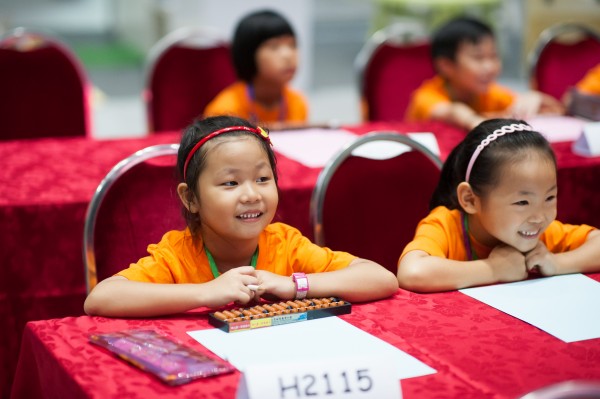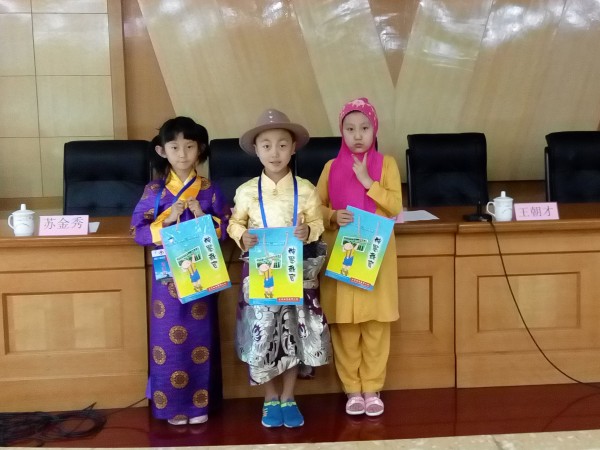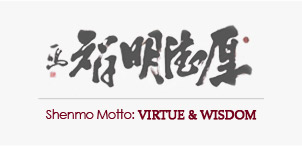SHENMO MOTTO: Virtue & Wisdom
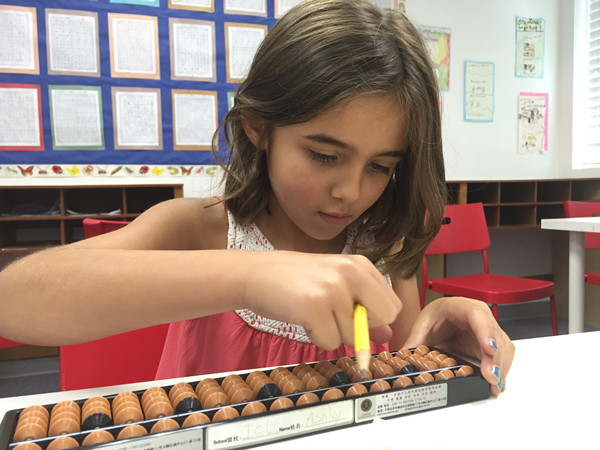
-
The Interpretation of Shenmo’s Core Educational Concept
2019-08-02 丨
The writer is from the Ministry of culture development

The Interpretation of Shenmo’s Core Educational Concept
“Equality, respect, trust, appreciation, concern and encouragement” are the core educational concept of Shenmo. Whether in the education in campus or in the work and training in team, these six words have always been the guiding principles of Shenmo staff with their profound connotations and important significance.
(I) Equality
The equality that Shenmo advocates is actually its literal meaning. As far as its definition, it probably refers to the same value and dignity, as well as the same personhood among people regardless of their different gender, ethnicity, occupation, economic status, lifestyle, etc. That’s equality.
Everyone is equal and deserves to have the same opportunities of growth such as the educational opportunity. Furthermore, equality also shows in rights, for example, people share equal laws, respect, communication and business.
Equality has dimensions. Let’s take the education of ours as an example:
The first dimension is that we should treat people equally. For example, we believe that parents should be treated equally. Although parents' perception, their level of education, and their understanding of education are different, we should not treat them differently. What’s more, children should be treated equally. This should be especially understandable to educators. All children, regardless of their natural abilities and personality, should be treated equally, and should enjoy the right to education. People who are cultivated all hold the view that people are equal.
The second dimension is that there's equality between ourselves and others. This is sometimes difficult to be detected. For example, when a supervisor communicates with a teacher, the supervisor may often feel that his/her status is higher than the teacher. Such case also exists in the communication between the principal the supervisor. To solve this problem, awareness should be deployed.
There is also a situation in which we may have a little bit of inequality in the educational concepts and cognitive courses when communicating with parents. Of course, this situation may not be widespread, but I hope we all have the ability to discover it. Once it happens, we should discover and correct it in time. For example, if we think that we know more, or are more professional than parents, there is inequality.
Such thought is wrong. When we are handling with children, although our intellectual abilities are higher than children, children and we are equal in personality and spirit. Therefore, the equality between people does not mean that there is no gap between them. Instead, equality means mutual understanding and respect in spirits without differential treatment.
Equality is extremely important of all core concept, because there will be no respect, trust, appreciation, attention, concern or encouragement without equality. Inequality means differential treatment. Here we’ll not say too much about it, because differential treatment is another concept, which belongs to inequality of course. It will kill a lot of good qualities, for example, humility, responsibility, and open thinking, thus hindering people's progress in learning and the promotion of wisdom. In all, equality is the foundation of education.
(II) Respect
Respect means looking up to and attaching importance to someone. It is an attitude of treating others equally. Respect means we should have identical mentality and words and deeds towards everyone. Disrespect is usually related to one’s overall quality such as moral and cultural quality while respect comes from one’s knowledge, ability and experience, which is positively correlated with the respect to others.
For example, people who have babysat children know that children have little experience. Although they are young enough, they actually have a rich inner world. Similarly, we should treat parents or adults with respect. Disrespect comes from poor communication!
Here, let me tell you a story that President Li Mianjun once told.
Some years ago, a student in Linyi School went back home alone after class, due to the negligence of teachers and lateness of his parents. His mother came to the school later and blamed teachers for their irresponsibility. She thought that was dangerous, and she was worried about her child.
Teachers in Linyi School could do nothing but apologize. But they were unhappy about that actually, because first, the child was too naughty to be managed, and he took the initiative to go back home alone without permission; second, the child had been safe anyway, and the reaction of his mother made a fuss. There was some misunderstanding.
Later, during the home visit, the teachers went to the student's home and saw the actual situation, only when they knew that the student's home was far away, and his family was so poor, which can be described as utterly destitute in the era of more than a decade ago. In such a family, the mother sent his child to our school as she had high expectation and considerable trust, and attached great importance to the school, so when teachers didn't take care of her child, she was extremely disappointed.
Knowing this situation, the teachers no longer had disrespect to this mother; instead, they respected her more. Understanding brings respect. This is a story telling us that to live up to the expectations of all parents, we need to understand them and their children.
(III) Trust
Trust is an attitude, an ability and the foundation of all relationships. Without trust, any interaction or cooperation is hard to accomplish. Literally speaking, trust means to believe that someone is righteous and reliable; in short, it is to believe in someone. However, in Shenmo’s core concept, trust shares another meaning, that is, to be trustworthy.
In education, trust is not only to always believe the students in achieving their goals and gaining better growth but also to believe parents who can give full cooperation to school for better education of their children. In life and work, the trust in others will also bring great spiritual strength to those around you and yourself. In contrast, questioning others or even oneself all the time will cause the loss of strength.
Trust is a two-way thing. We should trust others and be trustworthy. Educators, in particular, must have the ability to gain the trust of parents and students. Therefore, trust partly comes from the understanding of others and the growth of oneself. Enhancing the “trust value” is important for both the improvement of educational achievements and the growth of individuals.
(IV) Appreciation
Appreciation comes after respect. Its literal meaning is that we should see the merits of others. I think that if we only achieve this level, it is far from complete. We should see the efforts of others.
Why should children be appreciated? Because they take efforts in learning and other aspects, and we must see their diligence. In the process of learning or working, one has to experience “basic understanding-skillful-proficient-excellent” in turn.
There are two barriers during this stage: the first one is “difficult”, which may be experienced in the process from utterly ignorant to “basic understanding”, and from “basic understanding” to “skillful”. Take abacus mental math for example, it is very difficult at the beginning of learning, that is, from “basic understanding” to “skillful”, so is playing the piano and dancing. Therefore, we must recognize students’ efforts and help them go through the difficulties.
The second barrier is “impatient”, which may be experienced in the process from “basic understanding” to “skillful”, and from “skillful” to “proficient”. “Impatient” appears because learners need to do exercises repeatedly but may achieve little effect. At this time, we should see the efforts children have made, and encourage and recognize them to give them power. This is the power of appreciation. We should also see the efforts of adults in the process of daily school management and communication with them.
Therefore, appreciation doesn’t mean praising children. Because these are innate attributes. Children may be proud for their innate attributes. However, these boastful children will always meet people who are more beautiful and are smarter than them in the future. If this child thinks he/she is very smart, and can take less efforts to get significant results, he/she will be eager for quick success, or even be vainglorious. That is surely not what we want.
People need to be appreciated skillfully, and appreciation has the educational attribute. We should recognize their efforts, and help them go through the barriers of “difficult” and “impatient”. Appreciation must be given attentively on the basis of respect. Respect is based on equality, and equality comes from understanding, so appreciation should be used to recognize the efforts of others.
(V) Concern
“Concern” means attaching importance to others. We must pay attention to, and attach importance to children. Another point is that you should pay attention to everyone. In education, try not to leave a blind spot of concern. Everyone needs to be concerned although people’s demand for concern is different.
(VI) Encouragement
Encouragement means giving strength, confidence, and hope. While encouraging children or others, we should notice what we are giving to them. For children, the ultimate goal of encouragement is to help them set aspiration, and let them know that human effort is the decisive factor.
Encouragement comes after appreciation. One is firstly appreciated for his efforts, and then be encouraged to set goals, and finally work hard for the goal. He will be sure to make it.
This is the key words--equality, respect, trust, appreciation, concern, and encouragement. We can actually summarize them with one word--love. This is also the focus of education: treating students and those around you with love.
“Equality, respect, trust, appreciation, concern and encouragement” are the core educational concept of Shenmo. Whether in the education in campus or in the work and training in team, these six words have always been the guiding principles of Shenmo staff with their profound connotations and important significance.
(I) Equality
The equality that Shenmo advocates is actually its literal meaning. As far as its definition, it probably refers to the same value and dignity, as well as the same personhood among people regardless of their different gender, ethnicity, occupation, economic status, lifestyle, etc. That’s equality.
Everyone is equal and deserves to have the same opportunities of growth such as the educational opportunity. Furthermore, equality also shows in rights, for example, people share equal laws, respect, communication and business.
Equality has dimensions. Let’s take the education of ours as an example:
The first dimension is that we should treat people equally. For example, we believe that parents should be treated equally. Although parents' perception, their level of education, and their understanding of education are different, we should not treat them differently. What’s more, children should be treated equally. This should be especially understandable to educators. All children, regardless of their natural abilities and personality, should be treated equally, and should enjoy the right to education. People who are cultivated all hold the view that people are equal.
The second dimension is that there's equality between ourselves and others. This is sometimes difficult to be detected. For example, when a supervisor communicates with a teacher, the supervisor may often feel that his/her status is higher than the teacher. Such case also exists in the communication between the principal the supervisor. To solve this problem, awareness should be deployed.
There is also a situation in which we may have a little bit of inequality in the educational concepts and cognitive courses when communicating with parents. Of course, this situation may not be widespread, but I hope we all have the ability to discover it. Once it happens, we should discover and correct it in time. For example, if we think that we know more, or are more professional than parents, there is inequality.
Such thought is wrong. When we are handling with children, although our intellectual abilities are higher than children, children and we are equal in personality and spirit. Therefore, the equality between people does not mean that there is no gap between them. Instead, equality means mutual understanding and respect in spirits without differential treatment.
Equality is extremely important of all core concept, because there will be no respect, trust, appreciation, attention, concern or encouragement without equality. Inequality means differential treatment. Here we’ll not say too much about it, because differential treatment is another concept, which belongs to inequality of course. It will kill a lot of good qualities, for example, humility, responsibility, and open thinking, thus hindering people's progress in learning and the promotion of wisdom. In all, equality is the foundation of education.
(II) Respect
Respect means looking up to and attaching importance to someone. It is an attitude of treating others equally. Respect means we should have identical mentality and words and deeds towards everyone. Disrespect is usually related to one’s overall quality such as moral and cultural quality while respect comes from one’s knowledge, ability and experience, which is positively correlated with the respect to others.
For example, people who have babysat children know that children have little experience. Although they are young enough, they actually have a rich inner world. Similarly, we should treat parents or adults with respect. Disrespect comes from poor communication!
Here, let me tell you a story that President Li Mianjun once told.
Some years ago, a student in Linyi School went back home alone after class, due to the negligence of teachers and lateness of his parents. His mother came to the school later and blamed teachers for their irresponsibility. She thought that was dangerous, and she was worried about her child.
Teachers in Linyi School could do nothing but apologize. But they were unhappy about that actually, because first, the child was too naughty to be managed, and he took the initiative to go back home alone without permission; second, the child had been safe anyway, and the reaction of his mother made a fuss. There was some misunderstanding.
Later, during the home visit, the teachers went to the student's home and saw the actual situation, only when they knew that the student's home was far away, and his family was so poor, which can be described as utterly destitute in the era of more than a decade ago. In such a family, the mother sent his child to our school as she had high expectation and considerable trust, and attached great importance to the school, so when teachers didn't take care of her child, she was extremely disappointed.
Knowing this situation, the teachers no longer had disrespect to this mother; instead, they respected her more. Understanding brings respect. This is a story telling us that to live up to the expectations of all parents, we need to understand them and their children.
(III) Trust
Trust is an attitude, an ability and the foundation of all relationships. Without trust, any interaction or cooperation is hard to accomplish. Literally speaking, trust means to believe that someone is righteous and reliable; in short, it is to believe in someone. However, in Shenmo’s core concept, trust shares another meaning, that is, to be trustworthy.
In education, trust is not only to always believe the students in achieving their goals and gaining better growth but also to believe parents who can give full cooperation to school for better education of their children. In life and work, the trust in others will also bring great spiritual strength to those around you and yourself. In contrast, questioning others or even oneself all the time will cause the loss of strength.
Trust is a two-way thing. We should trust others and be trustworthy. Educators, in particular, must have the ability to gain the trust of parents and students. Therefore, trust partly comes from the understanding of others and the growth of oneself. Enhancing the “trust value” is important for both the improvement of educational achievements and the growth of individuals.
(IV) Appreciation
Appreciation comes after respect. Its literal meaning is that we should see the merits of others. I think that if we only achieve this level, it is far from complete. We should see the efforts of others.
Why should children be appreciated? Because they take efforts in learning and other aspects, and we must see their diligence. In the process of learning or working, one has to experience “basic understanding-skillful-proficient-excellent” in turn.
There are two barriers during this stage: the first one is “difficult”, which may be experienced in the process from utterly ignorant to “basic understanding”, and from “basic understanding” to “skillful”. Take abacus mental math for example, it is very difficult at the beginning of learning, that is, from “basic understanding” to “skillful”, so is playing the piano and dancing. Therefore, we must recognize students’ efforts and help them go through the difficulties.
The second barrier is “impatient”, which may be experienced in the process from “basic understanding” to “skillful”, and from “skillful” to “proficient”. “Impatient” appears because learners need to do exercises repeatedly but may achieve little effect. At this time, we should see the efforts children have made, and encourage and recognize them to give them power. This is the power of appreciation. We should also see the efforts of adults in the process of daily school management and communication with them.
Therefore, appreciation doesn’t mean praising children. Because these are innate attributes. Children may be proud for their innate attributes. However, these boastful children will always meet people who are more beautiful and are smarter than them in the future. If this child thinks he/she is very smart, and can take less efforts to get significant results, he/she will be eager for quick success, or even be vainglorious. That is surely not what we want.
People need to be appreciated skillfully, and appreciation has the educational attribute. We should recognize their efforts, and help them go through the barriers of “difficult” and “impatient”. Appreciation must be given attentively on the basis of respect. Respect is based on equality, and equality comes from understanding, so appreciation should be used to recognize the efforts of others.
(V) Concern
“Concern” means attaching importance to others. We must pay attention to, and attach importance to children. Another point is that you should pay attention to everyone. In education, try not to leave a blind spot of concern. Everyone needs to be concerned although people’s demand for concern is different.
(VI) Encouragement
Encouragement means giving strength, confidence, and hope. While encouraging children or others, we should notice what we are giving to them. For children, the ultimate goal of encouragement is to help them set aspiration, and let them know that human effort is the decisive factor.
Encouragement comes after appreciation. One is firstly appreciated for his efforts, and then be encouraged to set goals, and finally work hard for the goal. He will be sure to make it.
This is the key words--equality, respect, trust, appreciation, concern, and encouragement. We can actually summarize them with one word--love. This is also the focus of education: treating students and those around you with love.

-
NEXT:
The Key to Children's Education is to Let Them Feel Success On Sep 16, 2019 >
LATEST

- First Online Shenmo Training for Ru On Mar 29, 2021
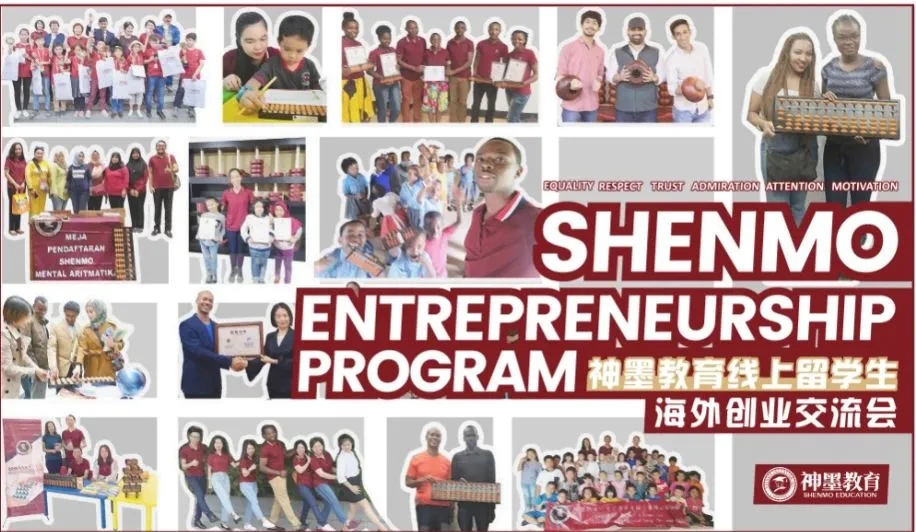
- Online Shenmo Entrepreneurship Exchange Meeting On Mar 29, 2021

- First Shenmo Online Abacus Mental M On Feb 03, 2021
EVENTS
Combination of Traditional Culture and Mo On Jun 02, 2020
Shenmo News:Shenmo Nigeria Abacus Mental On Oct 23, 2019
Shenmo News:The delegation of the 1st On Oct 21, 2019



